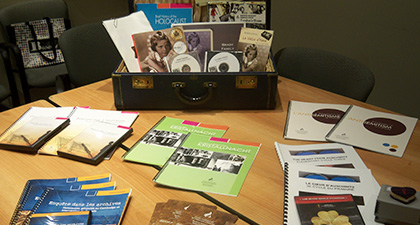A generation ago, the Jewish community feared the Shoah would be forgotten because young people weren’t learning about it. But that has changed dramatically in Quebec in the last few years, says Alice Herscovitch, executive director of the Montreal Holocaust Memorial Centre (MHMC), which has seen a surge of interest from teachers and students about the Holocaust.
“The last couple of years, especially, things have really been moving quickly,” she said. “People talk about ‘Holocaust fatigue’, but we are seeing the exact opposite.”
Over 2014-15, a record 11,866 students visited the MHMC museum, the vast majority – over 10,000 – with their class, from Grade 6 through university, but predominantly high schools. That’s out of a visitor total of 16,701, also an all-time high.
Requests for the pedagogical tools the MHMC produces and for teacher training opportunities have also soared, said Herscovitch, as has use of its easy-to-find digital and social media gateways. She believes this should put to rest the common perception that the Holocaust is being completely ignored by Quebec schools.
Herscovitch says teachers are provided with appropriate materials, and they are guided in, not only what to teach, but how to do so in a way the teacher feels comfortable, is relevant to Quebec youth, and fits into the province’s education requirements.
“The extent to which the Holocaust is taught depends on the initiative and the ability of teachers,” she said. A surprising number of teachers today are not only willing, but passionate about imparting the Holocaust, she said.
For those who are not, Herscovitch believes the best approach is to “encourage interest in a positive, constructive way, rather than hit people over the head and accuse them of not teaching enough.”
At the same time, the MHMC strives to avoid “dumbing down” or evading the harsh realities of history, or the impact the Holocaust continues to have on society.
More than 80 per cent of the student visitors came from within the province, almost 60 per cent of them were francophones, and, of the 11,866 total, more than 30 per cent were from outside Montreal.
The dozens of schools that visited the museum and/or use its tools shows how far-flung they are: Montmagny, Chertsey, Cowansville, Shawinigan, and so on.
In 2014, there were over 32,000 downloads of educational materials from the MHMC website, “which means thousands of teachers are at least looking at it,” said Herscovitch. Those who can’t get to the museum can download iPad or Android apps for a virtual tour or watch clips of 150 survivor testimonies on YouTube, for example.
It’s true that the teaching of the Holocaust is not mandatory in Quebec, Herscovitch said, but that is the case everywhere else in Canada. World history of any kind is woefully neglected in the province’s prescribed curriculum, she says.
The Holocaust may be taught in schools according to education ministry guidelines, but the two textbooks recommended are not the best, says Herscovitch, and the province could do more than merely mention the Holocaust.
The most popular of the dozen tools the MHMC provides is the Brief History of Holocaust: A Reference, published in 2012, which summarizes the facts, with illustrations, in just 34 pages. Like all MHMC materials, it is available in English and French and free of charge – both as a hard copy and online.
It answers the need for basic information that can be “understood as a human story; this is about families and communities that were destroyed,” she said. The testimonies of Montreal survivors – the MHMC has recorded 760 – and the artifacts some gave the museum introduce the Holocaust as “not just something that happened long ago and far away to people we don’t know.”
Twenty-four survivors still volunteer to speak to students, and last year they were heard by 11,768 Quebecers, mostly in classrooms. As they age, increasingly they communicate via Skype.
Teacher training opportunities include the MHMC’s biennial conference. The theme of the next one on Oct. 28 is “Generation Web 2.0: Teaching and Learning About the Holocaust and Other Genocides with Media-Based Resources.” About 100 educators are expected to attend. And each summer for more than a decade, with the support of local benefactors, Quebec teachers have attended Yad Vashem’s program in Jerusalem for educators from abroad.
